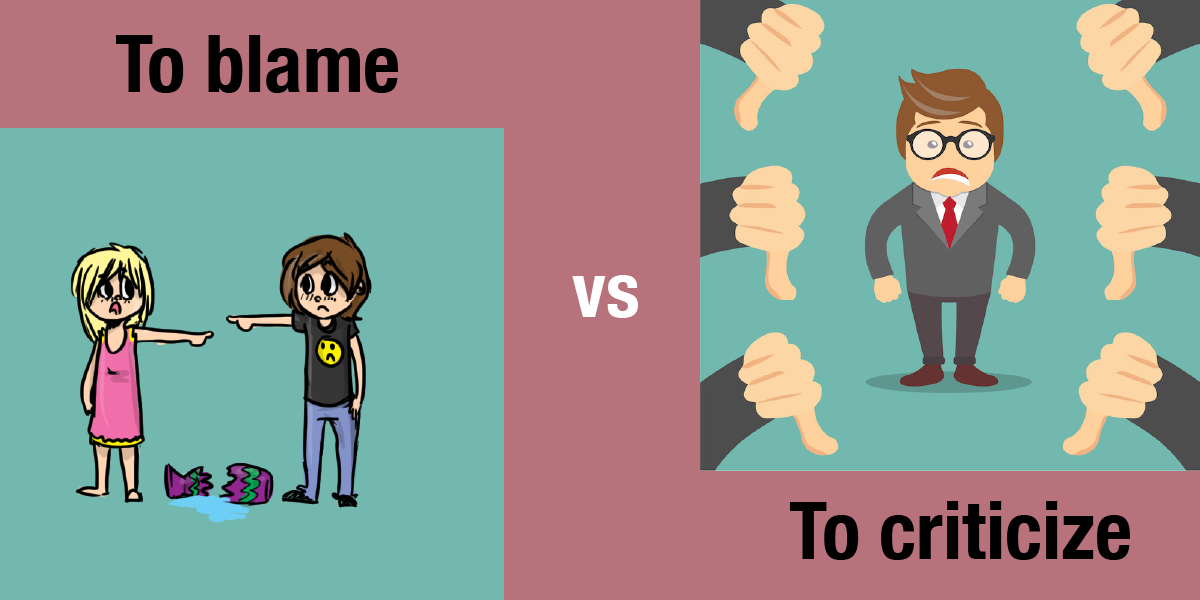あなたは英語を話すとき、これらの単語を正しく使えていますか?
※はじめにお伝えしたいこと: 私たちエクスリンガルの講師は、生徒さんたちが授業中にしてしまう、よくある間違いについて、頻繁に記事を書きます。これらの記事を投稿する目的は、私たちのコミュニティの皆様が、共通の間違いから学べるようにすることです。しかし、私たちエクスリンガルは、全ての生徒さんに対して、授業の中で間違い、それらから学ぶことを非常に強く奨励しています。私たちは、マルチリンガルな語学学習愛好家として、間違いをすることなく早急に言語を身につけることは不可能だということを知っています。間違いを避けようとしながら学習する人々は、間違いをしてもそれを気楽に受け止めながら学習する人々と比べ、習得速度が著しく遅いということは事実です。私たちの英語の授業において、話し間違いや書き間違いがあったとしても、それを恐れる必要は全くありません。
これら二つの動詞、‘to blame’ と ‘to criticize’ は非常によく似ており、私の英語教育経験上、誤って使用されることが非常に多いです。実際、私がこの記事を書いている理由は、ここ2週間の間の3回のレッスンで、‘to blame’ と ‘to criticize’ の使い方を訂正し、英会話の中でこれらの言葉がいかに間違って使われているかを改めて思い知らされたからです。これらの言葉には微妙な違いがあり、時に互換性があるかもしれませんが、一般的には、どちらかの言葉を誤った文脈で使用すると、英語のネイティブスピーカーにはすぐに気付かれることでしょう。
この記事では、‘to blame’ と ‘to criticize’ の微妙な違いを理解し、これらの言葉を正しく使えるよう、一般的な文型をいくつか紹介したいと思います。また、あなたの語学力をさらに高められるよう、似たような意味を持つ文型もいくつか載せています。
to blame
それでは早速、‘to blame’ から、辞書の定義を見てみましょう。ケンブリッジ辞書にはこのように定義されています。
“to blame: to say or think that someone or something did something wrong or is responsible for something bad happening: “
ここで重要なのは、‘responsibility for something bad happening’ です。つまり ‘to blame’ は、ある問題が、何かまたは誰かによって直接引き起こされたことを言うということです。
例文やシチュエーションは、私が説明するよりもはるかにこの考え方を説明するのに役立つと思います。また簡単な使用法を学び、試してみることも出来るでしょう。覚えておいていただきたいことは、日本語には訳そうとしないことです。むしろ文章を何度も読み、その単語の使い方の感覚を掴みましょう。
一般的な文型: → to blame {someone or something} for {some bad situation}
The bad situation → John failed his math exam.
John blamed his math teacher for his failure, but in reality he didn’t do
his homework or study hard enough.
The bad situation → Many people lost their lives in Turkey.
Engineers blamed the Turkish government for the high death toll in the 7.8 magnitude earthquake. They said that the government had allowed constructors to avoid safety regulations.
The bad situation → Jenny has no self confidence.
Jenny blames her parents for her lack of self confidence. She says they were too strict with her when she was a child.
The bad situation → France lost to South Africa in the rugby world cup quarter finals.
Many rugby fans in France are blaming the referee Ben O’Keefe for France’s loss to South Africa. They say he made very bad decisions which resulted in France losing the game.
一般的な文型: → to blame {someone or something} for {some bad situation}
The bad situation → The house is very cold.
Gary: It is freezing cold in this house!
Taro: Yes, I think the old heating system is to blame. We need to replace it.
The bad situation → There are many homeless people.
Yuko: Who do you think is to blame for all of these homeless people?
Kenichi: Personally, I feel the mayor is to blame. The city hasn’t built enough public housing.
一般的な文型: → to blame {something bad} on {someone or some reason}
The bad situation → The economy is not good.
The government blamed the poor economy on the high price of fuel due to the war.
The bad situation → There were not many voters at the election.
The city council blamed the low numbers of voters on the extremely cold weather.
また名詞 ‘blame’ も動詞 ‘to blame’ と同じように、似たような状況で、様々な構文の中で使われます。名詞 ‘blame’ を使った以下の一般的な文型をご覧ください。
一般的な文型:→ to put the blame for {something bad} on {someone or something}
Teachers are putting the blame for the students’ bad behavior in class on their parents.
Politicians often put the blame for failure on someone else.
一般的な文型:→ to lay the blame for {something bad} on {someone or something}
Poorer countries are laying the blame for climate change on rich countries.
She laid the blame for her failures on me. I think it’s not fair!
一般的な文型: → to accept the blame for {something bad}
John accepted the blame for the poor performance of the team. He said he will try better next time.
I can’t accept the blame for the sports day being canceled! I don’t think the weather is my fault.
Who is going to accept the blame for the terrible food at the party?
to criticize
動詞 ‘to criticize’ は、‘to blame’ よりもより一般的に使われます。例えば私たちは、誰かやある組織に関して、その方針やふるまい、行動について、否定的なことを言うことがあります。この場合、そこに明確な問題はありませんが、与えられる意見は一般的に否定的なものです。では、‘to blame’ ではなく動詞 ‘to criticize’ を使うべきだと思われる間違いの例をいくつか見ていきましょう。
X Sarah blamed her friend for the way she dressed.
O Sarah criticized her friend for the way she dressed.
X The US government is blaming the Chinese government.
O The US government is criticizing the Chinese government.
X Brad Pitt was blamed for the speech he gave at the Oscar ceremony.
O Brad Pitt was criticized for the speech he gave at the Oscar ceremony.
X My boss blamed my presentation.
O My boss criticized my presentation.
X The government policies have been heavily blamed by the media.
O The government policies have been heavily criticized by the media.
上記の例では、特定の問題があるわけではないので、‘to blame’という動詞を使うべきではありません。ただ他人の計画やふるまい、または行動が好きではないだけであり、そのため、彼らを批判する( ‘criticize’ )のです。
一般的な文型:→ to criticize {someone, some behavior, action, thing}
He criticized her hairstyle.
My teacher criticized my behavior in class.
Parents often criticize their children.
My husband often criticizes me, I’m not very happy with him.
一般的な文型:→ to criticize {someone or some organization} for {some actions, policy or behavior}
Many in the media criticized Joe Biden for his policy regarding Israel.
Tony criticized the way I handled the problem, he said I should have been more careful.
一般的な文型:→ to be criticized by {someone} for {some action or behavior}
I was criticized by the team for how I handled the customer.
The politician was criticized by the left wing for being too hard on immigrants.
Young people are often criticized by older people for their behavior in public.
I hate being criticized by my mother for my fashion sense.
My boss criticized me for often being late for meetings.
ここで、 ‘constructive criticism’ という概念があることにも注意してください。これは、ある人が誰かや何かの組織を批判したとしても、それがある意味では対象となる人や組織がより良くなることを目的としているという考え方のことです。従ってその批判は否定的なものではなく、有益なものと見なされます。
My boss gave me constructive criticism on my presentation
I would like to get your constructive criticism on this idea.
Our customers' constructive criticism is very important to us.
結論として、私たちは、何か特定の問題があり、その原因が誰かや何かであると言いたいときに、‘to blame’ を使う傾向にあります。また、あるふるまいや方針、行動についてそれらが一般的に良くないと言いたいとき、‘to criticize’ を使うことが多いです。
これら二つのやや複雑な類似動詞をより正しく使っていく上で、以上のような文型や自然な文章があなたのお役に立てれば幸いです。私たちエクスリンガルは、長久手市、みよし市、そして名古屋市東部にお住まいの皆様や生徒さんの英語学習の助けになりたいと考えております。私たちのスクールの無料レベルチェックと体験レッスンにぜひお越しください。レベルチェック・体験レッスンともに無料となっておりますので、ぜひ試してみてくださいね。
あなたの英語学習という旅を応援しています!



